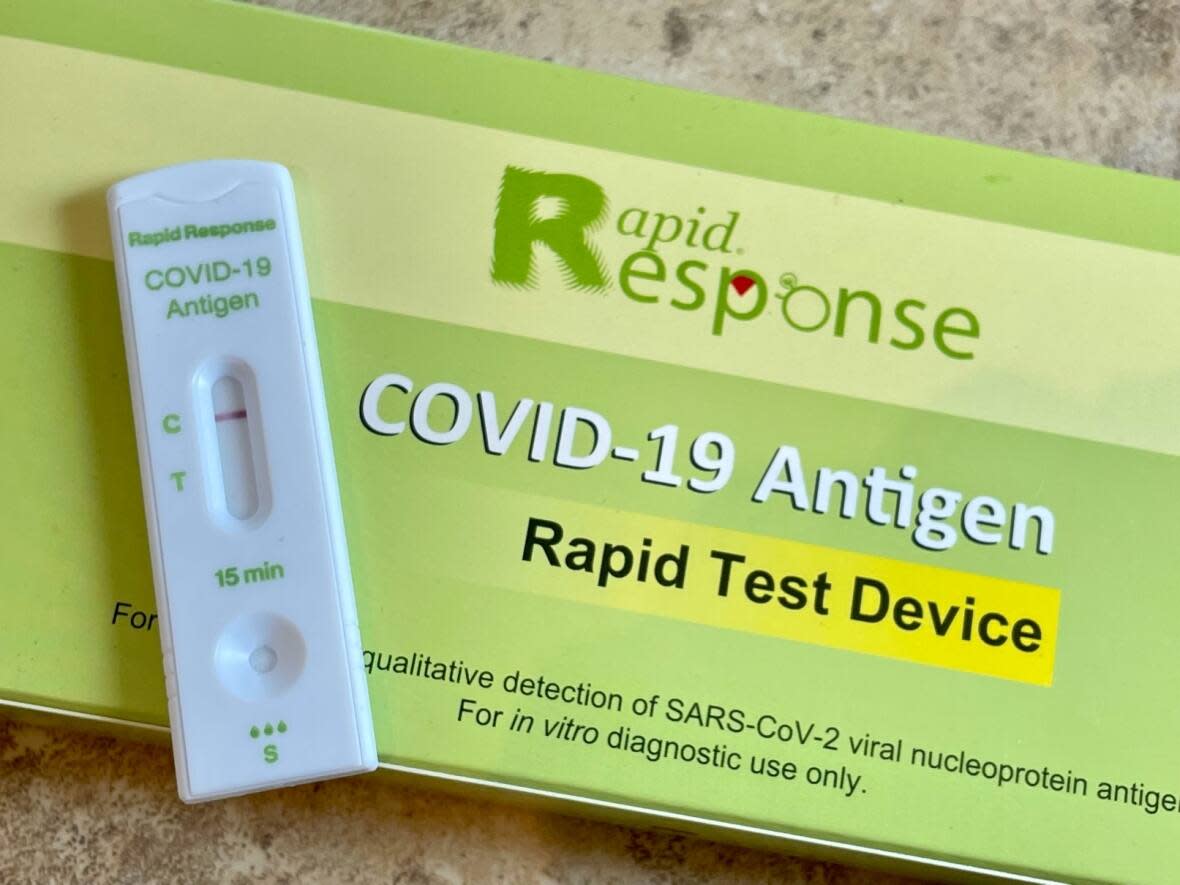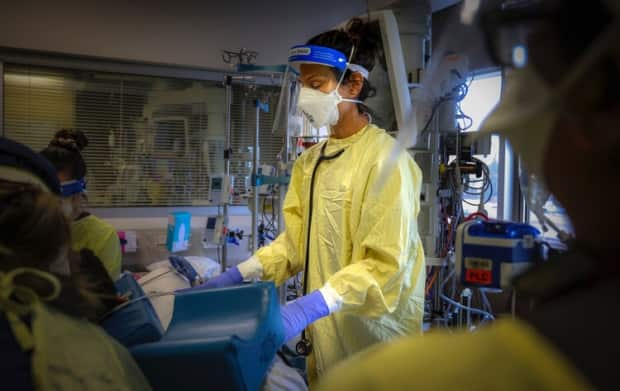N.B. expands access to COVID-19 rapid tests, as virus claims 4 more lives

New Brunswick is making it easier for people to obtain COVID-19 rapid tests, the Department of Health announced on Wednesday, after the province recorded four more COVID-related deaths in the past week.
People no longer need to have COVID symptoms to qualify for a rapid test kit, and the kits will be available for pickup at more locations, particularly in rural areas, including libraries or municipal offices.
The tests should still only be used when people are symptomatic, "as that is when they are most effective and useful," said Dr. Yves Léger, acting deputy chief medical officer of health.
And people still need to schedule an appointment to pick up a test kit, either online or by calling 1-833-437-1424.
"Appointments are still there in order to make sure that … our distribution spots are open and they have supply on hand to provide to folks," Léger said.
Asked why New Brunswick can't follow the lead of other jurisdictions that don't require appointments, he said the province is always looking at ways to improve access.
"If that's one of the ways that, you know, we can look at going forward, that's certainly something that we'll look at."
The province also needs to be a "good steward" of the public supply, added Léger.
"So we need to make sure that we're using it the most appropriate way possible and making sure that, you know, we maintain that supply."

Although Léger could not immediately say how many rapid test kits the province has in stock or when a new shipment is expected, it does have "an ample supply" heading into the fall and winter months, when COVID activity is expected to increase.
Public Health encourages people to keep only a small number of kits on hand to ensure that supply remains "healthy," he said.
The anticipated increase in COVID activity is "important … to keep in mind," but the impetus for the decision to increase access is Public Health's continuous review of "how to improve things," said Léger.
He could not say when the kits are set to expire.
People who are symptomatic should arrange to have someone else pick up a test kit, if possible, Léger said.
"We know that COVID-19 is still circulating in New Brunswick, and that New Brunswickers want to do their best to minimize the spread of the virus within their communities."
The rapid test kits are now available at 82 locations "scattered across the province," said Department of Health spokesperson Adam Bowie.
He could not say how many of those are new.
"It's been a gradual increase, with new sites coming online incrementally. We didn't just open a whole slew of new sites today," he said in an email.
When people book an appointment to pick up a kit, they will be given a list of the sites closest to them, officials said.
Province reports 21 hospitalizations, RHAs say 96
The rapid test kit announcement comes as the virus claimed the lives of four more people, all 90 or older, the province's COVIDWatch report for Sept. 11 to Sept. 17 shows. Their deaths raise New Brunswick's pandemic death toll to 480.
Hospitalizations decreased to 21 from 35, including two people who require intensive care, down from four, according to Public Health.
The province's two regional health authorities, meanwhile, say there are 96 New Brunswickers hospitalized either for or with COVID-19 as of Saturday, up from 81 a week ago.
Unlike Public Health, which only reports people hospitalized because of COVID-19, Horizon and Vitalité also include in their weekly reports those initially admitted for another reason who later test positive for the virus.
Eight people are in intensive care, down from 12, the Horizon and Vitalité COVID-19 dashboards show.

The number of people newly admitted to hospital for COVID-19 also decreased this week to 21, compared to 23 last week, according to the province.
Among the new admissions is one person in their 50s, two in their 60s, 10 in their 70s, six in their 80s and two 90 or older.
The highest portion of hospitalizations for COVID-19 is among people aged 70 to 89, the COVIDWatch report indicates.
People who are unprotected by vaccine continue to have the highest rate of hospitalization for COVID-19 and ICU admissions, it says.
A total of 1,451 doses of COVID-19 vaccines were administered across the province in the past week, according to the Department of Health. That includes 192 first doses, 115 second doses, 438 third doses, also known as first boosters, and 706 fourth doses, or second boosters.
As of Wednesday, 90.5 per cent of eligible New Brunswickers have received their first dose of a COVID-19 vaccine, 85.4 per cent have received their second dose, 53.6 per cent have received their first booster, and 20.9 per cent have received their second booster — all unchanged from a week ago.
The Department of Health did not immediately respond to a request for a breakdown of vaccination rates by age.
Léger would like to see the rates increase.
"We know the vaccines work well to protect against infection, but they're much more effective at protecting against severe outcomes — so the hospitalizations and deaths. And booster doses help to maintain that protection," he said.
"So, you know, certainly we take every opportunity we can to encourage people to make sure they're up to date And especially, again, as we're going into the fall and we expect to see an increase in COVID activity in the coming months, it's all that much more important for folks to make sure they're up to date."
PCR cases 'stable'
The number of new cases of COVID-19 reported across the province jumped to 1,091, from 955, including those confirmed with a PCR (polymerase chain reaction) lab test and people who self-reported testing positive on a rapid test.
This comes after students have been back to school for about two weeks with no mandatory COVID-19 protective measures.
There are 843 active cases of COVID across the province, based on PCR-confirmed cases alone.
Léger described this week's report as "positive" overall, with a reduction in some numbers and stabilization in others.

The number of new PCR-confirmed cases of COVID-19 has remained "stable" this week at 586, compared to 575 in the previous report, Public Health said.
The Moncton region, Zone 1, has the largest share of the new cases, at 212, followed by 133 in Zone 3, the Fredericton region, 85 in Zone 2, the Saint John region, 54 in Zone 7, the Miramichi region, 48 in Zone 6, the Bathurst region, 42 in Zone 4, the Edmundston region, and 12 in Zone 5, the Campbellton region.
Another 505 cases were self-reported through positive rapid test results, up from 380.
The Moncton region, Zone 1, also has the largest share of these, at 170. The distribution of the other positive results includes:
Saint John region, Zone 2, 116
Fredericton region, Zone 3, 148
Edmundston region, Zone 4, 23
Campbellton region, Zone 5, eight
Bathurst region, Zone 6, 22
Miramichi region, Zone 7, 18
Of the most recent random samples sent for sequencing, 93 per cent were the highly transmissible Omicron subvariant BA.5, six per cent were the Omicron subvariant BA.4, and the other one per cent were Omicron subvariant BA.2.
New Brunswick has had 76,902 lab-confirmed cases of COVID-19 since the beginning of the pandemic, with 75,579 of those now considered resolved.
Hospital outbreaks, sick staff
The Horizon Health Network reports 71 active COVID-19 hospital admissions, including five people in intensive care. That compares to 57 and six respectively the previous week.
Vitalité Health Network reports 25 patients hospitalized, up from 24, with three in intensive care, down from six the previous week.
There are COVID-19 outbreaks on 10 Horizon hospital units, including five in the Moncton region, Zone 1, three in the Saint John region, Zone 2, one in the Fredericton region, Zone 3, and one in the Miramichi region, Zone 7. No other details are provided.
Vitalité has outbreaks at the Dr. Georges-L.-Dumont University Hospital Centre in Moncton on the geriatric unit (3A), rehabilitation unit (3F), and nephrology unit (4F); and at the Stella-Maris-de-Kent Hospital in Sainte-Anne-de-Kent on the care unit.
The number of health-care workers off the job because of COVID-19 has dropped to 98, from 147.
Horizon has 46 employees off because they tested positive for the virus, down from 76, while Vitalité has 52 infected employees, down from 71.


